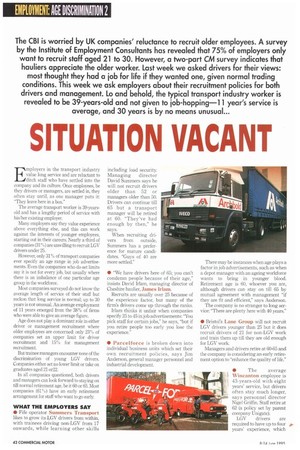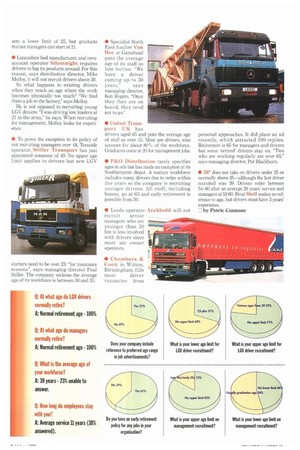SITUATION VACANT
Page 44

Page 45

If you've noticed an error in this article please click here to report it so we can fix it.
The CBI is worried by UK companies' reluctance to recruit older employees. A survey by the Institute of Employment Consultants has revealed that 75% of employers only want to recruit staff aged 21 to 30. However, a two-part CM survey indicates that hauliers appreciate the older worker. Last week we asked drivers for their views: most thought they had a job for life if they wanted one, given normal trading conditions. This week we ask employers about their recruitment policies for both drivers and management. Lo and behold, the typical transport industry worker is revealed to be 39-years-old and not given to job-hopping-11 year's service is average, and 30 years is by no means unusual...
F, imployers in the transport industry value long service and are reluctant to
ditch staff who have settled into the company and its culture. Once employees, be they drivers or managers, are settled in, they often stay until, as one manager puts it: "They leave here in a box."
The average transport worker is 39-yearsold and has a lengthy period of service with his/her existing employer.
Many employers say they value experience above everything else, and this can work against the interests of younger employees. starting out in their careers. Nearly a third of companies (31%) are unwilling to recruit LGV drivers under 25.
However, only 31°,10 of transport companies ever specify an age range in job advertisements. Even the companies who do set limits say it is not for every job, but usually where there is an imbalance of one particular age group in the workforce.
Most companies surveyed do not know the average length of service of their staff but reckon that long service is normal; up to 30 years is not unusual. An average employment of 11 years emerged from the 38% of firms who were able to give an average figure, Age does not play a dominant role in either driver or management recruitment where older employees are concerned: only 23% of companies set an upper limit for driver recruitment and 15% for management recruitment.
But trainee managers encounter none of the discrimination of young LGV drivers. Companies either set no lower limit or take on graduates aged 21 or22.
In all companies questioned, both drivers and managers can look forward to staying on till normal retirement age, be it 60 or 65. Most companies (61%) have an early retirement arrangement for staff who want to go early WHAT THE EMPLOYERS SAY • Fife operator Summers Transport likes to grow its LGV drivers from within, with trainees driving non-LGV from 17 onwards, while learning other skills
including load security. Managing director David Summers says he will not recruit drivers older than 52 or managers older than 50. Drivers can continue till 65 but a transport manager will be retired at 60. "They've had enough by then," he says.
When recruiting drivers from outside, Summers has a preference for mature candidates. "Guys of 40 are more settled."
• "We have drivers here of 65; you can't condemn people because of their age," insists David Irlani, managing director of Cheshire haulier, James Irlam.
Recruits are usually over 25 because of the experience factor, but many of the firm's drivers come up through the ranks.
Irlam thinks it unfair when companies specify 25 to 45 in job advertisements: "You pick staff for certain jobs," he says, "but if you retire people too early you lose the experience."
• Parcelforce is broken down into individual business units which set their own recruitment policies, says Jim Anderson, general manager personnel and industrial development.
There may be instances when age plays a factor in job advertisements, such as when a depot manager with an ageing workforce wants to bring in younger blood. Retirement age is 60, whoever you are, although drivers can stay on till 65 by mutual agreement with management "if they are fit and efficient," says Anderson.
The company is no stranger to long service: "There are plenty here with 40 years."
• Bristol's Lane Group will not recruit LGV drivers younger than 25 but it does recruit drivers of 21 for non-LGV work and train them up till they are old enough for LGV work.
Managers and drivers retire at 60-65 and the company is considering an early retirement option to "enhance the quality of life,"
• The average Wincanton employee is 43-years-old with eight years' service, but drivers often stay much longer, says personnel director Nigel Griffin. Staff retire at 62 (a policy set by parent company Unigate).
LGV drivers are required to have up to four years' experience, which • Lancashire bed manufacturer, and ownaccount operator Silentnight requires drivers to lug its products around. For this reason, says distribution director, Mike Molloy, it will not recruit drivers above 30.
So what happens to existing drivers when they reach an age where the work becomes physically too much? "We find them a job in the factory," says Molloy.
He is not opposed to recruiting young LGV drivers: "I was driving low loaders at 21 in the army," he says. When recruiting for management, Molloy looks for experience.
• To prove the exception to its policy of not recruiting managers over 48, Teesside operator, Stiller Transport has just appointed someone of 49. No upper age limit applies to drivers but new LGV
starters need to be over 23: "for insurance reasons", says managing director Paul Stiller. The company reckons the average age of its workforce is between 30 and 35.
• Specialist North East haulier Van Hee at Gateshead puts the average age of its staff as late forties. "We have a driver coming up to 30
years," says managing director, Ken Rogers. "Once they they are on board, they tend not to go."
• United Transport UK has drivers aged 65 and puts the average age of staff as over 45. Most are drivers, who account for about 80% of the workforce. Graduates come at 20 for management jobs.
• P&O Distribution rarely specifies ages in ads but has made an exception at its Southampton depot. A mature workforce includes many drivers due to retire within five years so the company is recruiting younger drivers. All staff, including bosses, go at 63 and early retirement is possible from 50.
• Leeds operator Archbold will not
recruit senior managers who are younger than 30 but is less involved with drivers since most are owner operators. personal approaches. It did place an ad recently, which attracted 100 replies. Retirement is 65 for managers and drivers but some 'retired' drivers stay on. "Two who are working regularly are over 65," says managing director, Pat Blackburn.
• BP does not take on drivers under 25 or normally above 35—although the last driver recruited was 39. Drivers retire between 54-60 after an average 20 years' service and managers at 52-60. Rival Shell makes no reference to age, but drivers must have 3 years' experience.
7 by Patric Cunnane






































































































